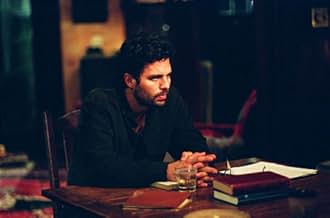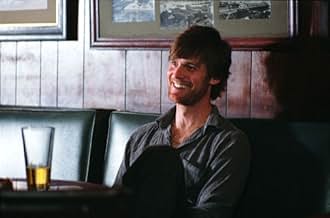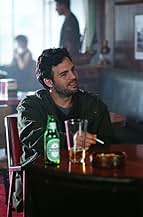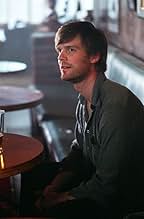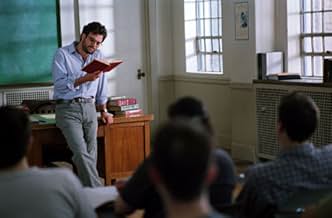CALIFICACIÓN DE IMDb
6.2/10
10 k
TU CALIFICACIÓN
Una indiscreción entre dos amigos íntimos destruye sus respectivos matrimonios.Una indiscreción entre dos amigos íntimos destruye sus respectivos matrimonios.Una indiscreción entre dos amigos íntimos destruye sus respectivos matrimonios.
- Dirección
- Guionistas
- Elenco
- Premios
- 2 premios ganados y 4 nominaciones en total
- Dirección
- Guionistas
- Todo el elenco y el equipo
- Producción, taquilla y más en IMDbPro
Opiniones destacadas
Director John Curran's "We Don't Live Here Anymore" is a continuously sizzling, attention-holding drama about two couples - best friends - who are perched precariously in twisted relationships that threaten their marriages and imperil the security of their children.
Jack Linden (Mark Ruffalo) is married to Terry (Laura Dern) and they have two small children, a boy and a girl. Their closest friends, with whom they spend much (too much from my popcorn-munching perspective) time, are Hank Evans (Peter Krause) and Edith (Naomi Watts). They've got one pre-teen daughter. Jack and Hank teach English literature and creative writing at a small college in the rural area where they live. Both aspire to be published authors of fiction.
Jack has a torrid affair going with Edith, who feels neglected by her husband. Maybe at heart she simply doesn't like him anymore, much less love him. Hank's a fellow who thinks that free love is a guiltless and fine option that should co-exist with marriage. He doesn't care if Edith engages in adulterous liaisons, a normal part of his married life. Actually he's an empty-headed ass. He certainly isn't in tune with contemporary legal standards about refraining from sexually-laced comments to female students. In addition to being an ass, it's fair to say he's a pig too.
Terry suspects the affair while also being pursued by Hank. Hank the skirt-chaser is imbued with a touch of sociopathy. No evidence of conscience or feelings about the harm he might wreak disturbs his calm mien. Kudos to Peter Krause for investing Hank with such single-minded devotion to self-gratification that the viewer constantly wonders, "He's got to be a mensch, finally, no?" No.
Terry and Jack's marriage is in a rut. Terry imbibes too much and as contrasted to Edith, as a housewife she's a bit of a sloven, a trait for which she's excessively berated by Jack. Ruffalo is alternately sympathetic and repelling as a guy auto-fast-forwarded to his mid-life crisis.
Surprise-as the relationships become more complex, psychologically and sexually, the kids, all three of them, are in the middle. Only Terry seems to understand, with the desperateness of a shipwrecked sailor clinging to a plank, that preserving her marriage is in her kids' best interests if not necessarily her own.
Naomi Watts, who co-produced the movie, is beautiful and her dalliance with Jack is, for her, much more than a regular tumble for sexual diversity. She's alternately funny and deeply wistful, not fully in control of her world. A fine acting job.
But the emotional core of "We Don't Live Here Anymore" is the stunningly brilliant, ever remarkable Laura Dern, one of the greatest (and shamefully most underemployed) actresses working today. Dern's Terry is confused and desperate at times but her strongest, most ferocious belief is that the center must hold. Her center is her marriage and kids. And she loves Jack as no one else can and as he is too blind to appreciate.
Dern deserves an Oscar nomination for her fierce, gripping performance. Her facial expressions and her desperate pleading with Jack reflect a woman who isn't so much afraid of a marital breakup as she is hauntingly, achingly aware of what it will do to their kids. Pursued by Hank, rejected by Jack, Dern's Terry wavers but always hangs on to an inner strength the other three protagonists never had.
"Bob & Carol and Ted & Alice" decades ago parodied the sexual revolution that included, for some, mate swapping and adultery as - almost - a rite of passage for young, well-educated, affluent couples. "We Don't Live Here Anymore" updates the pseudo-sophistication of that portrayal and blazingly shows the human cost that may or may not make adultery worthwhile. The end here is as reassuring as viewers want (or need) it to be.
The cinematography is excellent. The score, ranging from Beethoven's Symphony No. 1 to bagpipe music to an almost minimalist accompaniment to critical scenes, is well integrated with Larry Cross's crisp screenplay. The original short stories by Andre Dubos are well adapted.
A powerful film, "We Don't Live Here Anymore" takes what could have been a "B" soap opera and through the brilliant acting of the quartet of leading characters brings to life an absorbing and meaningful story.
9/10
Jack Linden (Mark Ruffalo) is married to Terry (Laura Dern) and they have two small children, a boy and a girl. Their closest friends, with whom they spend much (too much from my popcorn-munching perspective) time, are Hank Evans (Peter Krause) and Edith (Naomi Watts). They've got one pre-teen daughter. Jack and Hank teach English literature and creative writing at a small college in the rural area where they live. Both aspire to be published authors of fiction.
Jack has a torrid affair going with Edith, who feels neglected by her husband. Maybe at heart she simply doesn't like him anymore, much less love him. Hank's a fellow who thinks that free love is a guiltless and fine option that should co-exist with marriage. He doesn't care if Edith engages in adulterous liaisons, a normal part of his married life. Actually he's an empty-headed ass. He certainly isn't in tune with contemporary legal standards about refraining from sexually-laced comments to female students. In addition to being an ass, it's fair to say he's a pig too.
Terry suspects the affair while also being pursued by Hank. Hank the skirt-chaser is imbued with a touch of sociopathy. No evidence of conscience or feelings about the harm he might wreak disturbs his calm mien. Kudos to Peter Krause for investing Hank with such single-minded devotion to self-gratification that the viewer constantly wonders, "He's got to be a mensch, finally, no?" No.
Terry and Jack's marriage is in a rut. Terry imbibes too much and as contrasted to Edith, as a housewife she's a bit of a sloven, a trait for which she's excessively berated by Jack. Ruffalo is alternately sympathetic and repelling as a guy auto-fast-forwarded to his mid-life crisis.
Surprise-as the relationships become more complex, psychologically and sexually, the kids, all three of them, are in the middle. Only Terry seems to understand, with the desperateness of a shipwrecked sailor clinging to a plank, that preserving her marriage is in her kids' best interests if not necessarily her own.
Naomi Watts, who co-produced the movie, is beautiful and her dalliance with Jack is, for her, much more than a regular tumble for sexual diversity. She's alternately funny and deeply wistful, not fully in control of her world. A fine acting job.
But the emotional core of "We Don't Live Here Anymore" is the stunningly brilliant, ever remarkable Laura Dern, one of the greatest (and shamefully most underemployed) actresses working today. Dern's Terry is confused and desperate at times but her strongest, most ferocious belief is that the center must hold. Her center is her marriage and kids. And she loves Jack as no one else can and as he is too blind to appreciate.
Dern deserves an Oscar nomination for her fierce, gripping performance. Her facial expressions and her desperate pleading with Jack reflect a woman who isn't so much afraid of a marital breakup as she is hauntingly, achingly aware of what it will do to their kids. Pursued by Hank, rejected by Jack, Dern's Terry wavers but always hangs on to an inner strength the other three protagonists never had.
"Bob & Carol and Ted & Alice" decades ago parodied the sexual revolution that included, for some, mate swapping and adultery as - almost - a rite of passage for young, well-educated, affluent couples. "We Don't Live Here Anymore" updates the pseudo-sophistication of that portrayal and blazingly shows the human cost that may or may not make adultery worthwhile. The end here is as reassuring as viewers want (or need) it to be.
The cinematography is excellent. The score, ranging from Beethoven's Symphony No. 1 to bagpipe music to an almost minimalist accompaniment to critical scenes, is well integrated with Larry Cross's crisp screenplay. The original short stories by Andre Dubos are well adapted.
A powerful film, "We Don't Live Here Anymore" takes what could have been a "B" soap opera and through the brilliant acting of the quartet of leading characters brings to life an absorbing and meaningful story.
9/10
This is a difficult film to sit through. It presents a lot of morality issues that are unnerving. Andre Dubus' work always asked a lot of questions about human relations like the ones that are presented here from two of his short pieces.
It takes courage to take this material and bring it to the screen. Naomi Watts appears as one of the producers and she is to be congratulated even though we might be turned off by what we are watching. John Curran's directing the screen play from Larry Gross shows he has an eye for the material even though the pace is slow.
The actual victims of the affairs of Jack and Terry and Hank and Edith, are their children. It is obvious the two daughters are going to be scarred for life. They see and understand a lot more, than they might seem to, well beyond their young ages. In fact, it appears both girls know what their parents are doing.
It's easy to have an extra marital affair, but people entering into a relationship such as the quartet in this film do, have to realize they ultimately have to pay for their actions. Jack realizes it at the last moment. He knows he can't leave his son and daughter behind. Edith, on the other hand, had no problem continuing seeing Jack, as long as it was cool with him.
Hank, the young English teacher, whose poem is published by The New Yorker, lives in a fantasy world. We don't see him attached to his daughter Sharon, the same way we know Jack is to his children. He hits on the female students without any problems. He couldn't care less what his own wife is doing.
Terry, on the other hand, has to prove herself. She is a woman that has seen better days. Her beauty is fading and her house is a mess. On the other hand, Edith's house is spotless. These two women are going through a turmoil in their lives.
The only positive thing is what Jack goes through when he takes the children to the river and suddenly we don't know whether he wants to kill them, or not. The idea of losing them is what makes him, at long last, see the light. We also get to see a contrite Edith leaving with her daughter Sharon toward the train tracks; there is a hint of a possible suicide attempt, but no, she wants to start a new life and making a new start. Edith, also, realizes too late how she has harmed her daughter.
The acting is excellent. Mark Ruffalo keeps changing from film to film. He is an interesting actor no matter what a movie asks him to do. The real revelation is Laura Dern. Her Terry is a composite of women of a certain age that suddenly realize they are not going anywhere and they have made mistakes along the way, almost losing her husband and family. Peter Krause is also effective as Hank, the callous writer in love with himself. Naomi Watts is the one that doesn't fare as well. Her Edith is an enigma. She is a woman obsessed with sex with another man, but at times we don't see enough heat coming from her.
Ultimately, the two young girls that play the two daughters, Jennifer Bishop, and Haili Page make their characters seem real without doing much, which is an accomplishment.
It takes courage to take this material and bring it to the screen. Naomi Watts appears as one of the producers and she is to be congratulated even though we might be turned off by what we are watching. John Curran's directing the screen play from Larry Gross shows he has an eye for the material even though the pace is slow.
The actual victims of the affairs of Jack and Terry and Hank and Edith, are their children. It is obvious the two daughters are going to be scarred for life. They see and understand a lot more, than they might seem to, well beyond their young ages. In fact, it appears both girls know what their parents are doing.
It's easy to have an extra marital affair, but people entering into a relationship such as the quartet in this film do, have to realize they ultimately have to pay for their actions. Jack realizes it at the last moment. He knows he can't leave his son and daughter behind. Edith, on the other hand, had no problem continuing seeing Jack, as long as it was cool with him.
Hank, the young English teacher, whose poem is published by The New Yorker, lives in a fantasy world. We don't see him attached to his daughter Sharon, the same way we know Jack is to his children. He hits on the female students without any problems. He couldn't care less what his own wife is doing.
Terry, on the other hand, has to prove herself. She is a woman that has seen better days. Her beauty is fading and her house is a mess. On the other hand, Edith's house is spotless. These two women are going through a turmoil in their lives.
The only positive thing is what Jack goes through when he takes the children to the river and suddenly we don't know whether he wants to kill them, or not. The idea of losing them is what makes him, at long last, see the light. We also get to see a contrite Edith leaving with her daughter Sharon toward the train tracks; there is a hint of a possible suicide attempt, but no, she wants to start a new life and making a new start. Edith, also, realizes too late how she has harmed her daughter.
The acting is excellent. Mark Ruffalo keeps changing from film to film. He is an interesting actor no matter what a movie asks him to do. The real revelation is Laura Dern. Her Terry is a composite of women of a certain age that suddenly realize they are not going anywhere and they have made mistakes along the way, almost losing her husband and family. Peter Krause is also effective as Hank, the callous writer in love with himself. Naomi Watts is the one that doesn't fare as well. Her Edith is an enigma. She is a woman obsessed with sex with another man, but at times we don't see enough heat coming from her.
Ultimately, the two young girls that play the two daughters, Jennifer Bishop, and Haili Page make their characters seem real without doing much, which is an accomplishment.
There was a Bergmanesque quality to "We Don't Live Here Any More," recalling the passionate stories and deep psychological insights into characters in the films of the Swedish auteur filmmaker. Like Bergman, director John Curran offered a sensitive touch to the film's deliberate style of pacing and the still moments where the characters seemed lost in thought.
The story of "We Don't Live Here Any More" focuses on two married couples in adulterous relationships. The physical environments helped to convey the essence of how mismatched the individual characters were in their marriages. The characters of Jack (Mark Ruffalo) and Edith (Naomi Watts) would have seemed much more at home in the cheerful and immaculate house. By contrast, Hank (Peter Krause) and Terry (Laura Dern) would have found a better fit in the cluttered, bohemian-style home. All four performances were moving and believable. From the film's opening scene, it was easy to see how the characters were propelled to one another.
This was not a perfect film. It would have been more true to life to focus on the emotional layers of characterization instead of the sex. For the most part, the four characters seemed like good parents, and it was difficult to imagine where they would find the time to set up their trysts and be away from home for protracted periods. The genius of Bergman was to tap into those deep layers of emotional pain, which seemed remarkably absent in this film. Instead of heading out into the forest or into the car, it would have been revealing to learn more about the characters' feelings in their own homes and in their own words.
Still, after viewing "We Don't Live Here Anymore," I found myself reflecting on the characters and the relationships many days later. And that is a sign of a good film!
The story of "We Don't Live Here Any More" focuses on two married couples in adulterous relationships. The physical environments helped to convey the essence of how mismatched the individual characters were in their marriages. The characters of Jack (Mark Ruffalo) and Edith (Naomi Watts) would have seemed much more at home in the cheerful and immaculate house. By contrast, Hank (Peter Krause) and Terry (Laura Dern) would have found a better fit in the cluttered, bohemian-style home. All four performances were moving and believable. From the film's opening scene, it was easy to see how the characters were propelled to one another.
This was not a perfect film. It would have been more true to life to focus on the emotional layers of characterization instead of the sex. For the most part, the four characters seemed like good parents, and it was difficult to imagine where they would find the time to set up their trysts and be away from home for protracted periods. The genius of Bergman was to tap into those deep layers of emotional pain, which seemed remarkably absent in this film. Instead of heading out into the forest or into the car, it would have been revealing to learn more about the characters' feelings in their own homes and in their own words.
Still, after viewing "We Don't Live Here Anymore," I found myself reflecting on the characters and the relationships many days later. And that is a sign of a good film!
"We Don't Live Here Anymore" is a sophisticated examination of the complexities of the difficult relationship that is contemporary marriage and family.
As it takes us awhile in the beginning to figure out who is attached in what couple, Mark Ruffalo, Laura Dern, Peter Krause and Naomi Watts superbly act a matched quartet of grown-up friends whose restlessness and frustrations with their personal and professional lives are gradually torn to shreds by propinquity and alcohol (and perhaps by community college teachers having too flexible schedules and temptations). The suspense comes in the revelation of the layers that get peeled off each and we wonder just how far each will go.
Each actor finds a unique response to their character's emotional situation and the production design well illustrates their individuality (though once again in a film I got fooled that I was supposed to think ill of a character like Dern's whose comfortable house is evidently a mess when it looks like mine, while I thought Watts' house was really cold in its spotlessness while gradually I realized I was supposed to think she was more together, but heck she had one less kid).
While I haven't read yet the two Andre Dubos short stories that Larry Gross adapted for the screenplay, Ruffalo's voice-over is used inconsistently as an occasional crutch to reveal inner thoughts probably to help bolster the denouement; otherwise the camera angles try to convey their thoughts, but that manipulates the audience a bit as to whom to root for.
Maryse Alberti's cinematography richly conveys summer passing in a beautiful yet claustrophobic college town.
The song selections are not particularly revelatory, but the music is effective at mood-setting.
As it takes us awhile in the beginning to figure out who is attached in what couple, Mark Ruffalo, Laura Dern, Peter Krause and Naomi Watts superbly act a matched quartet of grown-up friends whose restlessness and frustrations with their personal and professional lives are gradually torn to shreds by propinquity and alcohol (and perhaps by community college teachers having too flexible schedules and temptations). The suspense comes in the revelation of the layers that get peeled off each and we wonder just how far each will go.
Each actor finds a unique response to their character's emotional situation and the production design well illustrates their individuality (though once again in a film I got fooled that I was supposed to think ill of a character like Dern's whose comfortable house is evidently a mess when it looks like mine, while I thought Watts' house was really cold in its spotlessness while gradually I realized I was supposed to think she was more together, but heck she had one less kid).
While I haven't read yet the two Andre Dubos short stories that Larry Gross adapted for the screenplay, Ruffalo's voice-over is used inconsistently as an occasional crutch to reveal inner thoughts probably to help bolster the denouement; otherwise the camera angles try to convey their thoughts, but that manipulates the audience a bit as to whom to root for.
Maryse Alberti's cinematography richly conveys summer passing in a beautiful yet claustrophobic college town.
The song selections are not particularly revelatory, but the music is effective at mood-setting.
Watch this as a double-bill with Mike Nichols' "Closer," and you very well might swear off love, relationships and marriage for a very long time, if not forever.
The last screenwriter I'd expect to write a somber, almost Bergmanesque exploration of marriage and infidelity would be Larry Gross, whose credits include "48 HRS." (1982) and "Streets of Fire" 1984) for Walter Hill and "True Crime" (1999) for Clint Eastwood.
Yet Gross has turned two Andre Dubus short stories into an engaging, albeit somewhat depressing, movie that explores marital infidelities among two couples - Jack (Mark Ruffalo) and Terry Linden (Laura Dern); and Hank (Peter Krause) and Edith Evans (Naomi Watts).
Much like the Nichols film, "We Don't Live Here Anymore" can be tough viewing, at times. Uncomfortable, even occasionally painful. But the actors make it work, often lifting it above trite moments. Director John Curran keeps things tight and gets emotionally powerful performances from them. Though, the film would have smarted more had Krause injected some rawness into his role. Hank seems too laid-back about the whole affair and Krause's performance never inches past insouciant.
Dern throws herself fully into her strongest role since "Citizen Ruth" (1996). As a wife who's apparently lost the desire of her husband and really has little interest in housework, Dern does well to keep Terry from turning into a broad caricature. She makes Terry sad without turning her pathetic. A bedroom confrontation with Jack doesn't veer into clichés only because Dern and Ruffalo bring such brutal honesty to their roles.
Watts seems to revel in playing emotionally devastated women. Here, she throws in selfishness, to boot. Watts makes it awfully difficult for us to like Edith because she's the most manipulative of the lot. That we wind up caring about her speaks highly of Watts' acting ability.
The Lindens and the Evanses might very well take narcissism to a new level. These thoroughly self-absorbed people don't really care about the infidelity. In fact, they're so blasé about it all, you wonder if anything at all would jolt them into feeling something for someone else.
When Edith asks Jack, "How do you think we'll get caught?" she's not so much worried about her husband finding about the affair than her friend, Terry. And it's in delving into the Terry-Edith dynamic that Gross' script fails. We hear that these two women are dearest friends. Yet, we never get that feeling from watching them together. In fact, Gross never really gives either Dern or Watts, two incredible talents, the chance to play off each other. Their few scenes together barely scratch the surface of any friendship Terry and Edith might have.
True, there's nothing really sympathetic about any of these four people. I doubt redemption's around the corner, either. But the way they claw at each other's emotions, occasionally fraying themselves, as they lie and cheat, and even tell the truth, to their loved ones, makes for compelling viewing.
"We Don't Live Here Anymore" shows a side of marriage that movies, certainly American movies, rarely dare to depict. Marriage isn't easy. For many, it can be terribly hard work. Sometimes, painful and difficult work. And that's what this film shows.
You can't really say you enjoyed watching this movie, but it will linger with you long after you're done watching it; when you're stuck washing dirty dishes for the umpteenth time, picking up tossed-about laundry or suddenly realizing that your lover's quirk which you once thought was endearing and cute is now just positively irritating and infuriating.
The last screenwriter I'd expect to write a somber, almost Bergmanesque exploration of marriage and infidelity would be Larry Gross, whose credits include "48 HRS." (1982) and "Streets of Fire" 1984) for Walter Hill and "True Crime" (1999) for Clint Eastwood.
Yet Gross has turned two Andre Dubus short stories into an engaging, albeit somewhat depressing, movie that explores marital infidelities among two couples - Jack (Mark Ruffalo) and Terry Linden (Laura Dern); and Hank (Peter Krause) and Edith Evans (Naomi Watts).
Much like the Nichols film, "We Don't Live Here Anymore" can be tough viewing, at times. Uncomfortable, even occasionally painful. But the actors make it work, often lifting it above trite moments. Director John Curran keeps things tight and gets emotionally powerful performances from them. Though, the film would have smarted more had Krause injected some rawness into his role. Hank seems too laid-back about the whole affair and Krause's performance never inches past insouciant.
Dern throws herself fully into her strongest role since "Citizen Ruth" (1996). As a wife who's apparently lost the desire of her husband and really has little interest in housework, Dern does well to keep Terry from turning into a broad caricature. She makes Terry sad without turning her pathetic. A bedroom confrontation with Jack doesn't veer into clichés only because Dern and Ruffalo bring such brutal honesty to their roles.
Watts seems to revel in playing emotionally devastated women. Here, she throws in selfishness, to boot. Watts makes it awfully difficult for us to like Edith because she's the most manipulative of the lot. That we wind up caring about her speaks highly of Watts' acting ability.
The Lindens and the Evanses might very well take narcissism to a new level. These thoroughly self-absorbed people don't really care about the infidelity. In fact, they're so blasé about it all, you wonder if anything at all would jolt them into feeling something for someone else.
When Edith asks Jack, "How do you think we'll get caught?" she's not so much worried about her husband finding about the affair than her friend, Terry. And it's in delving into the Terry-Edith dynamic that Gross' script fails. We hear that these two women are dearest friends. Yet, we never get that feeling from watching them together. In fact, Gross never really gives either Dern or Watts, two incredible talents, the chance to play off each other. Their few scenes together barely scratch the surface of any friendship Terry and Edith might have.
True, there's nothing really sympathetic about any of these four people. I doubt redemption's around the corner, either. But the way they claw at each other's emotions, occasionally fraying themselves, as they lie and cheat, and even tell the truth, to their loved ones, makes for compelling viewing.
"We Don't Live Here Anymore" shows a side of marriage that movies, certainly American movies, rarely dare to depict. Marriage isn't easy. For many, it can be terribly hard work. Sometimes, painful and difficult work. And that's what this film shows.
You can't really say you enjoyed watching this movie, but it will linger with you long after you're done watching it; when you're stuck washing dirty dishes for the umpteenth time, picking up tossed-about laundry or suddenly realizing that your lover's quirk which you once thought was endearing and cute is now just positively irritating and infuriating.
¿Sabías que…?
- TriviaThe Irish step dance scene starts with a cutaway where the center dancer is actually a male dancer.
- Citas
[last lines]
Edith Evans: I'm not leaving you because you're unfaith Hank, I'm leaving because I was.
Hank Evans: Look, none of that matters any more. It's over. Isn't it? Isn't it, Edith?
Edith Evans: Yeah. It's over.
Hank Evans: Well then, why leave now?
Edith Evans: Because I can.
- Créditos curiososSpecial Thanks To Christine & Ben Christine, Terry & Kelly Kris & Fisher
- ConexionesFeatured in The 20th IFP Independent Spirit Awards (2005)
- Bandas sonorasJungle Warrior
Written by John Otieno
Performed by Matata
Courtesy of President Records Ltd. UK
Selecciones populares
Inicia sesión para calificar y agrega a la lista de videos para obtener recomendaciones personalizadas
- How long is We Don't Live Here Anymore?Con tecnología de Alexa
Detalles
- Fecha de lanzamiento
- Países de origen
- Sitios oficiales
- Idioma
- También se conoce como
- We Don't Live Here Anymore
- Locaciones de filmación
- Productoras
- Ver más créditos de la compañía en IMDbPro
Taquilla
- Presupuesto
- USD 3,000,000 (estimado)
- Total en EE. UU. y Canadá
- USD 2,041,014
- Fin de semana de estreno en EE. UU. y Canadá
- USD 101,295
- 15 ago 2004
- Total a nivel mundial
- USD 3,361,213
- Tiempo de ejecución1 hora 41 minutos
- Color
- Mezcla de sonido
- Relación de aspecto
- 2.35 : 1
Contribuir a esta página
Sugiere una edición o agrega el contenido que falta

Principales brechas de datos
What is the Spanish language plot outline for La Tentación (2004)?
Responda

